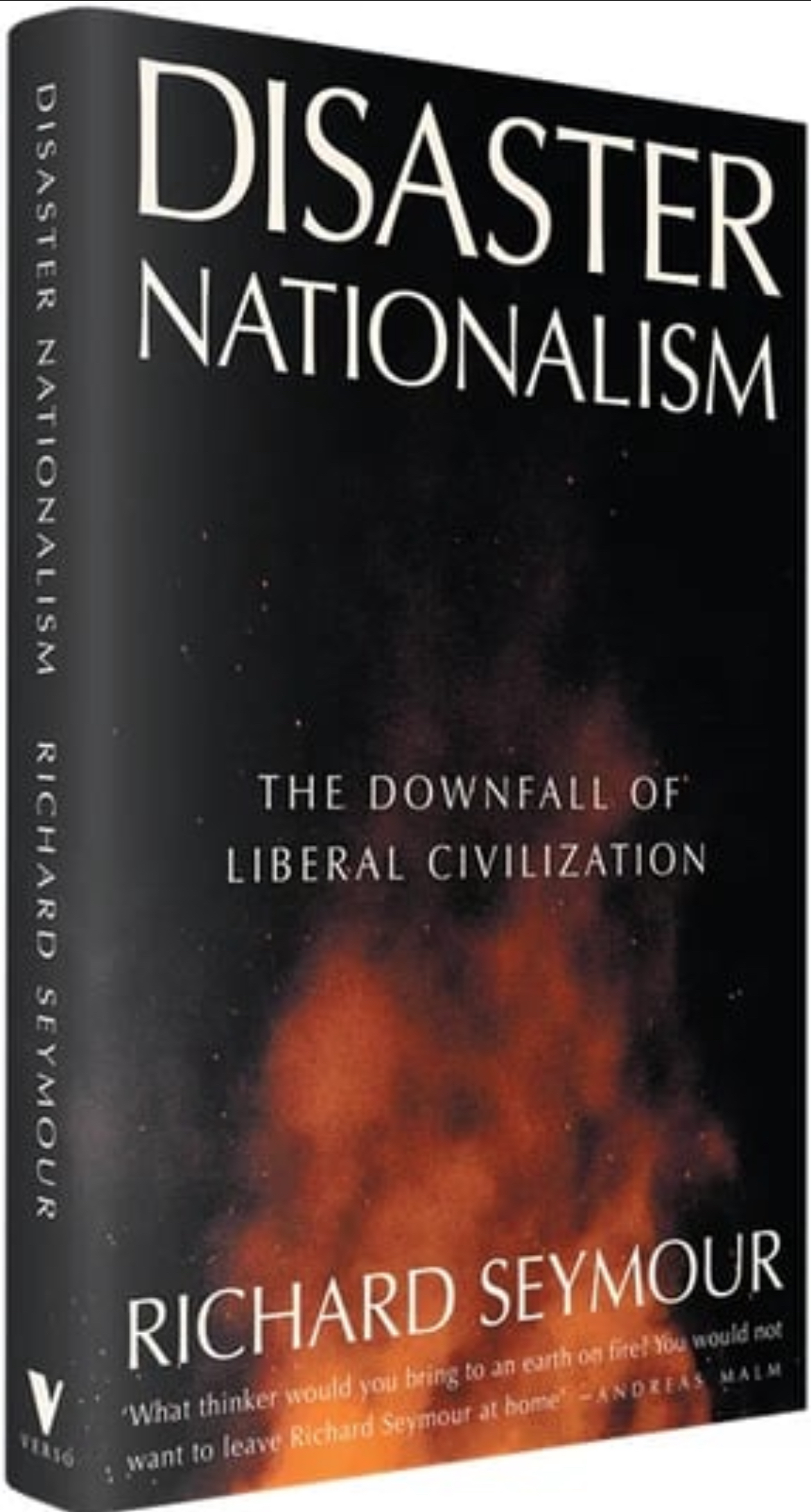
Richard Seymour’s new book ‘Disaster Nationalism’ captures the deep ideological and psychological intersections between climate collapse, disaster nationalism, and human solidarity, challenging simplistic narratives around contemporary political movements and environmentalism. Seymour, whose intellectual journey into climate consciousness began in 2015, grapples with the unsettling implications of our current trajectory. His transition from focusing solely on class and labour struggles to examining the politics of climate breakdown presents an evolved lens through which to understand the emergent right-wing nationalist movements and their appeal.
Seymour argues that current global shifts toward authoritarianism and far-right populism cannot be understood solely through traditional explanations like white supremacy or economic grievance. These movements, as seen in the US, Brazil, and India, offer a visceral allure: a vengeful, even apocalyptic nationalism that Seymour calls “disaster nationalism.” Such nationalism capitalises on the anxieties provoked by global crises, including environmental disasters, to create scapegoats and enemies, allowing supporters to feel as though they are taking a stand against a tangible threat. This ideological structure isn’t focused on overthrowing democracy in a classical fascist sense but rather on “a constitutional rupture breaking with all humane and ‘woke’ constraints on the exercise of power.”
While Seymour does not reduce the phenomenon of disaster nationalism solely to the climate crisis, he positions climate as a latent yet central component. Ecological breakdown acts as a kind of emotional accelerant, fuelling both despair and anger. Far-right ideologies provide an outlet for these feelings, channelling existential fears toward culturally constructed enemies. Here, the question emerges: why are people drawn to the fantasy of collapse rather than confronting the real and present disasters of ecological degradation? Seymour’s answer is twofold. Firstly, he suggests, there is a profound attraction to simplified, personalised explanations in an increasingly complex world. And secondly, there is a certain thrill, an “erotically charged” allure, to fantasies of societal breakdown and renewal. As he notes, “If I agree to fantasise about gruesome, erotically charged scenarios for whose reality I’ve been given no good evidence, I am not simply lacking ‘critical skills’ or ‘media literacy’: the fantasy is doing something for me.”
Seymour’s framing of disaster nationalism underscores a central paradox in human psychology: the preference for actionable, albeit false, explanations over abstract, systemic issues like climate change and capitalism. Climate change, as he argues, is an “un-shootable” enemy; a diffuse, structural force that resists the visceral confrontations populist rhetoric thrives on. Such abstract threats contrast sharply with the tangible, and often racialised, targets constructed by far-right leaders. In the US, for example, the 2020 Oregon wildfires became a platform for conspiracy theories as locals eschewed scientific explanations in favour of narratives blaming leftist agitators and immigrants. This psychological phenomenon is intensified by social media, where misinformation and fear-mongering take on lives of their own, filling voids left by the erosion of local journalism and community trust.
Such trends highlight the psychological dynamics underpinning far-right movements, but Seymour also addresses the socioeconomic factors that shape these ideologies. Though economic distress often aligns with radicalisation, Seymour notes that the core support base for figures like Bolsonaro, Duterte, and Modi tends to emerge not from the working class but from middle-class voters facing downward mobility. This trend illustrates the far right’s ability to harness economic instability, channeling it into culturally driven grievances. Scholar Andreas Malm similarly explores this dynamic in White Skin, Black Fuel: On the Danger of Fossil Fascism, where he argues that climate-driven crises increasingly lend themselves to reactionary agendas, particularly when they threaten privileged lifestyles. Far-right responses to climate change often dismiss scientific consensus or exploit the crisis to reinforce exclusionary policies, a stance that can be traced to the fact that acknowledging climate change would undermine fossil-fuel-based capitalist interests, interests often aligned with wealthy far-right backers.
The role of billionaires and corporations in fuelling disaster nationalism is integral to Seymour’s critique. Eco-socialism, by contrast, advocates for a radical shift away from these economic structures, proposing a system in which resources are managed collectively and sustainably. Seymour argues that far-right leaders often benefit from, or are directly backed by, the ultra-wealthy, who stand to lose if society moves toward eco-socialist policies that threaten their capital. Figures such as Jeff Bezos and Elon Musk, while publicly acknowledging climate concerns, are nevertheless invested in maintaining the capitalist status quo. Their influence bolsters neoliberal policies, perpetuating ecological destruction while redirecting climate anxieties toward a nationalist agenda that divides rather than unites people against shared challenges. In Seymour’s view, eco-socialism represents a fundamental rethinking of not only economic structures but also of humanity’s relationship to nature, recognising our dependence on ecosystems rather than positioning humans as dominators within a hierarchy.
This eco-socialist perspective contrasts starkly with what Seymour describes as “disaster capitalism”; a phenomenon where climate breakdown is not merely ignored but exploited by capitalists and their far-right allies for profit and power. Naomi Klein, in The Shock Doctrine, discusses how crises are frequently manipulated to implement neoliberal reforms, a trend increasingly relevant in the context of environmental disasters. Such “shock policies” are instrumentalised to erode labour rights, cut public services, and push private sector interests, with far-reaching consequences for social and ecological resilience.
Seymour’s own shift from urban-centric Marxist analysis to eco-socialist concerns emerged not only from intellectual curiosity but from a personal reckoning with nature. Recalling his childhood in Northern Ireland, he reflects on a time when his life was intertwined with the landscapes around him. His subsequent “hyper-urban” focus, however, reflected an understanding of labour struggles tied more to industrial than to rural spaces. Revisiting his roots in the natural world allowed him to see climate breakdown not only as an abstract political issue but as a personal loss. “It struck me that although things will go on in a way, nothing like that will ever exist again, it’s gone,” he reflects. For Seymour, this “climate mourning” was a turning point, compelling him to consider eco-socialism’s ethical and philosophical basis.
Eco-socialism, then, is not simply about reducing carbon emissions or implementing green technologies; it seeks to fundamentally transform the relationships between humans, other species, and the ecosystems on which we depend. The eco-socialist vision rejects the extractive mentality inherent in capitalist systems, advocating instead for a stewardship model that treats nature as a collective inheritance. In this framework, comradeship transcends the human sphere, encompassing other species and the environment itself. By reorienting human values toward community and care, eco-socialism challenges the isolating, competitive ethos that capitalism and its far-right defenders propagate. This is, as Seymour says, a radical love; a recognition that “we, human beings, do not sit at the top of a grand hierarchy.”
Indeed, Seymour’s conception of love is foundational to his eco-socialist ethics. He argues that the emotional connections fostered in solidarity movements, from labour strikes to community support networks, are vital. These connections do not merely emerge from shared economic interests but from a deep-seated need for companionship and empathy. Seymour’s experience volunteering at his local church exemplifies this ethos. There, volunteers offer “unconditional love for whoever walks in the door”; a stance he sees as a model for broader social relationships in a more compassionate world. This love, Seymour insists, is both radical and practical; it is not utopian idealism but a necessary reorientation toward sustainability and resilience in the face of climate catastrophe.
The psychological appeal of disaster nationalism, with its emphasis on personal enemies and cultural purity, may seem inevitable. But Seymour argues that alternative forms of collective identity—rooted in genuine human connection and environmental stewardship—offer a potent antidote. This is a form of “human comradeship” grounded in the acknowledgement of our interdependence. In his view, this ethos of mutual care and respect can counterbalance the isolating, combative narratives that disaster nationalism promotes. By fostering relationships based on cooperation and empathy, eco-socialism builds the kind of resilience that disaster capitalism undermines.
Critics might contend that Seymour’s eco-socialist vision is unrealistic, given the entrenched power of neoliberal and far-right alliances. However, he contends that human beings are capable of reimagining their values, pointing to the solidarity seen in unions and community groups as evidence. Environmental historian Jason W. Moore, in Capitalism in the Web of Life, supports this notion, arguing that capitalism’s relationship with nature is not inherent or immutable but a product of social and historical forces. Moore and Seymour both suggest that, by reframing our understanding of nature, we can challenge the structures that commodify and exploit it.
Ultimately, Seymour’s insights compel us to rethink not only our political structures but our cultural narratives. Disaster nationalism thrives on a mythology of individualism and cultural purity, offering a way to externalise and weaponise despair. Eco-socialism, in contrast, embraces the messiness of interdependence, recognising that human survival is bound to the health of the entire biosphere. This realisation demands a reconfiguration of values, where the love for one’s “comrades”—human and nonhuman alike—takes precedence over the self-interested motivations that drive both capitalist and nationalist ideologies.
Seymour’s reflections on eco-socialism, disaster nationalism, and human comradeship underscore the urgency of constructing a new narrative, one that offers a sense of hope and agency amid the climate crisis. As the far right capitalises on fears and divisions, Seymour calls for a movement grounded in solidarity, empathy, and respect for the living world. His work reminds us that while the allure of scapegoating and aggression may be strong, the bonds of mutual care and collective purpose are equally powerful. If humanity is to survive the ecological and social upheavals to come, it will require not just political reform but a profound cultural and ethical shift; toward a world in which we see ourselves as not only individuals but as part of a larger, interconnected whole.
The ten deadliest weather events in the International Disaster Database since 2004 were:
- Bangladesh, Cyclone Sidr, 2007: 4,234 died
- Myanmar, Cyclone Nargis, 2008: 138,366 died
- Russia, heatwave, 2010: 55,736 died
- Somalia, drought, 2010-2012: 258,000 died
- Uttakarand, India, flood, 2013: 6,054 died
- Philippines, Typhoon Haiyan, 2013: 7,354 died
- France, heatwave, 2015: 3,275
- Europe, heatwaves, 2022: 53,542
- Europe, heatwaves, 2023: 37,129
- Libya, Storm Daniel, 2023: 12,352
Those who deny that a climate disaster is occuring are part of the cancer of the mind that will help eradicate humanity and many other species.
Thank them on the way out!











